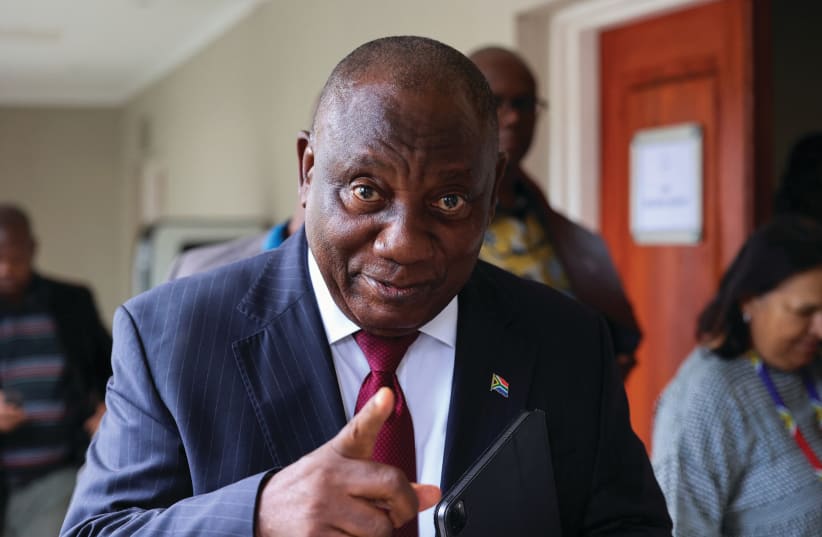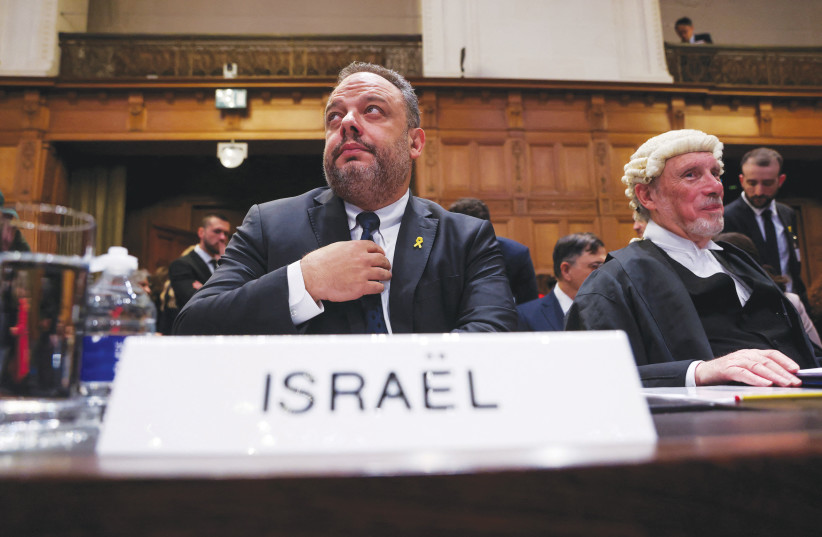On December 29, 2023, South Africa took Israel to the International Court of Justice, describing its assault on Gaza as genocidal. The Israel-Gaza conflict raises serious concerns over potential grave human rights violations, with almost 34,000 people killed and 77,000 wounded in Gaza, according to the Hamas Health Ministry, following the October 7, 2023 Hamas attack on Israel, which killed more than 1,200 people.
For some, this was a vindication of Nelson Mandela’s legacy, when he asserted that human rights will be the cornerstone of South Africa’s foreign policy. Putting aside the folly of viewing the Israel-Palestine conflict through the South African eyes of November 2023, it should be noted that Mandela himself found it difficult to successfully follow this in a world dominated by realpolitik.
In 1995, Nelson Mandela begged Nigerian military strongman General Sani Abacha to release Nigerian writer and environmental activist Ken Saro Wiwa and his fellow Ogoni activists. When Abuja proceeded with their execution, Mandela was incensed. He withdrew Pretoria’s High Commissioner to Nigeria and called for sanctions against the country and for its diplomatic isolation.
Despite the moral stature of Mandela and the reverence with which he was held globally, neither the Commonwealth nor other African nations adhered to Mandela’s call. Nigeria was just too large an actor in Africa and too strategic a partner to treat as a pariah.
Pretoria then had to reverse course and restore diplomatic relations with Africa’s behemoth and return South Africa’s High Commissioner to Abuja. The Nigerian debacle should have been a salutary lesson for South African foreign policy-makers.
It is a sad truism that the principle of respect for human rights is grounded in stark political realities and geo-strategic calculations. This has been true in international relations for millennia. Thucydides reminds us in his epic on the Peloponnesian war 2,400 years ago that all states must adapt to their differing levels of power and capabilities. Failure to do so will result in ruin as the tiny island of Melos found in its dealings with the might of the Athenian naval fleet.
Sadly, it is a lesson that South African policymakers have yet to learn. Pretoria taking Israel to The Hague and thereby antagonizing key Israeli allies like the United States and the European Union is akin to a Chihuahua insisting on picking a fight with a Rottweiler. It will not end well for South Africa.
Already there is the US-SA Bilateral Relations Review Bill making its way to the US Congress calling for a reevaluation of United States-South African bilateral relations on account of Pretoria’s stance on the Russian-Ukraine war, the country’s proximity to China, its accusing Israel of genocide, and its close ties with Hamas and Tehran.
Note the telephonic exchanges between South African Foreign Minister Naledi Pandor and Hamas, and her trip to Tehran immediately following the October 7 attack. Given the fragile nature of the South African economy and how dependent it is on foreign investment, this holds great risk for the country.
Why South Africa took Israel to the ICJ
THIS BEGS the question of why South Africa took Israel to the ICJ on the charge of genocide. It is clearly not in South Africa’s own national interests to antagonize Washington. South Africa is America’s largest trading partner on the African continent, with more than 600 US firms operating in the country. Moreover, two-way trade has surpassed $21 billion.
This importance of the US to South Africa cannot be overstated. Washington financially assists South Africa in areas as diverse as assistance to small enterprises to HIV/AIDS support and education.
South Africa’s sputtering economy, therefore, cannot afford to be excluded from the African Growth and Opportunity Act, which gives the country, along with several other African countries, preferential access to US markets. Clearly, South Africa’s faltering economy and society need constructive engagement with the United States.
Why then has South Africa insisted on taking Israel to the ICJ? While some have insisted that South Africa’s decision is in keeping with its human rights-anchored foreign policy from the Mandela period, this is not true. Mandela, himself, put friendship before human rights violations.
Consider, for instance, his close relationship with Libyan strongman, Muammar Qaddafi despite the latter’s less-than-stellar human rights credentials. Then there was the disastrous “quiet diplomacy” policy of Thabo Mbeki toward Zimbabwe, where despite the heinous human rights abuses suffered on his people, Pretoria stood by Robert Mugabe as South Africa was flooded by terrified Zimbabweans fleeing abuse and the ravages of an unworkable economic policy destined to only enrich those within the ruling party and its security apparatus.
The post-Mbeki era was no better. South Africa hardly distinguished itself during its time on the UN Human Rights Council, often siding with authoritarian states. Small wonder then that The Economist labeled South African foreign policy “clueless and immoral.”
Currently, there is unimaginable suffering taking place in Sudan. According to UN agencies, 8.6 million people are either internally displaced or made refugees by the fighting, and 25 million people are in dire need of humanitarian assistance. Eighteen million Sudanese are confronting severe famine. Systemic rape and pillaging are the norm in Sudan’s civil war.
The death toll is horrific and takes the form of ethnic cleansing. In just the city of El Geneina, in Western Darfur, between 10,000 and 15,000 were massacred. The group responsible for this massacre is the Rapid Support Forces (RSF). It is led by Mohamed Hamdan Dagalo (also known as General Hemedti).
In January, President Cyril Ramaphosa met with him at his official residence in Pretoria. South Africa’s Mail & Guardian headline describing the meeting captured the shock of many – Why did Cyril Ramaphosa gladhand a genocidal general? It was not lost on most international observers that Ramaphosa’s meeting with Hemedti took place the same month it was arguing the case for genocide against Israel at The Hague.
The human rights argument explaining South Africa’s stance on Israel holds little water. It is also preposterous to imagine that the governing African National Congress, which is mired in corruption and is criminally inept in its governance of the country, actually cares about the lives and rights of Palestinians. In their 30 years of (mis)governance, crime levels have soared, the technocratic basis of the civil service has all but collapsed under cadre deployment, the economy is in tatters, and their rapacious greed knows no bounds.
Consequently, large sectors of the country’s citizens have been reduced to extreme poverty; 55.5% of SA’s population (30.4 million people) live below R1,417 per month. Some 3.8 million people out of 10.2 million aged 15 to 24 years are unemployed or receiving education or training.
It is laughable to contemplate these self-same leaders concerning themselves with the predicament of Gaza’s citizens.
THIS STILL begs the question of what motivated the ANC government to take up the genocide charge against Israel for its relentless war in Gaza. Some have suggested that the ANC, which is doing badly in electoral polls, may be doing this since it has populist appeal among Muslim voters and members of the Left, such as its alliance partners in the Congress of South African Trade Unions (COSATU) and the South African Communist Party (SACP).
If true, this support will be marginal. Moreover, Palestinian solidarity hardly deals with the pressing bread-and-butter concerns that South African voters confront daily.
Others have pointed out that the ANC has had a history of trading South African foreign policy positions for cash. There has been speculation that the cash-strapped ANC contemplating an election year with empty coffers was suddenly cash-flushed, and that Iran may have been behind this miraculous change of fortunes in return for Pretoria taking Israel to the ICJ.
Similar explanations did the rounds during Hemedti’s visit to South Africa, with some believing that the United Arab Emirates facilitated Hemedti’s meeting with Ramaphosa.
The “genocidal general” has allegedly been supported by the UAE going back to when the RSF sent troops to both the UAE and its partners in their destructive war in Yemen against the Houthis. South Africa eagerly supplied these countries with arms to prosecute their war in Yemen. The brutal war in Yemen cost 377,000 lives at the end of 2021 – 70% of those fatalities were children under the age of five.
Whatever the motivation behind South Africa’s charging Israel with genocide, we can state two things categorically. First, it is not in the country’s national interests. Second, human rights considerations were not what motivated the ANC to rush off to The Hague.
The writer is a senior professor at the Centre for Gender and Africa Studies, University of the Free State, South Africa, and a researcher at the Israel-Africa Relations Institute.

